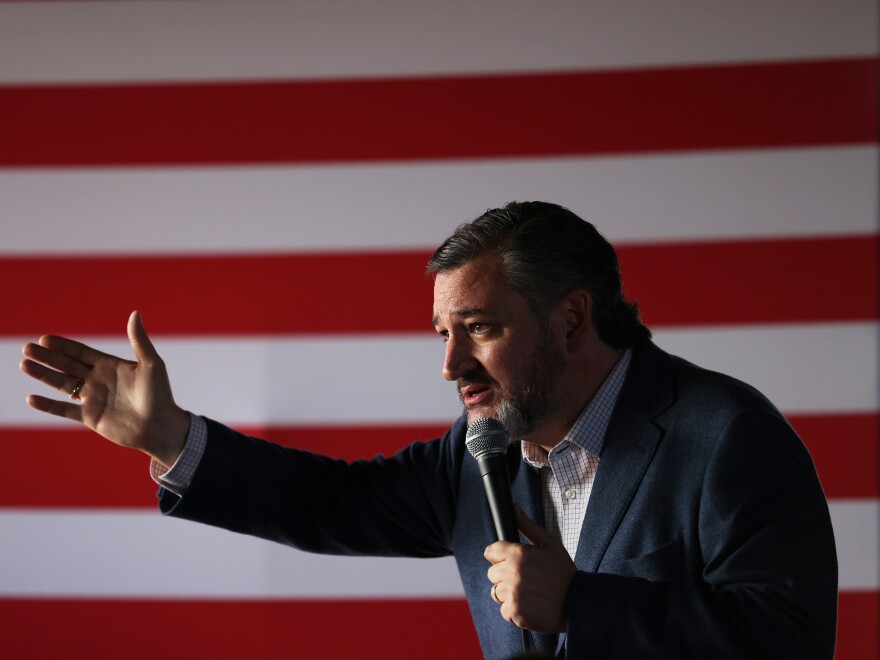The U.S. Supreme Court's conservative majority sided with Republican Sen. Ted Cruz on Monday, ruling that a federal ban on outsiders repaying a candidate's campaign loan to himself after an election violates the constitutional guarantee of free speech.
The vote was 6-to-3, with Chief Justice John Roberts writing the majority opinion.
Cruz challenged a federal law that has been on the books for 20 years. It bars federal candidates from raising more than $250,000 after an election to repay loans that the candidate made to his own campaign.
Roberts' majority opinion pointed to previous decisions holding that the First Amendment guarantee of free speech safeguards the ability of a candidate to use personal funds to finance his own campaign. Those personal funds, Roberts said, include a bank loan guaranteed by the candidate. To put a limit on money raised to repay such a personal loan after an election, Roberts said, would burden a candidate's core political speech.
'A continuing pattern of extreme hostility'
Campaign reform advocate Fred Wertheimer, president of Democracy 21, reacted with dismay, asserting that, "the money is going directly into the pocket of the officeholder, so its not really a campaign contribution, it's a financial gift."
Monday's decision, he said, represents "a continuing pattern of extreme hostility by the Supreme Court ever since Chief Justice Roberts came on the Court. They have really tilted the system to the very wealthy in this country."
But Roberts, addressing fears of influence peddling, said, "influence and access embody a central feature of democracy--that constituents support candidates who share their beliefs and interests, and candidates who are elected can be expected to be responsive to those concerns."
In dissent, Justice Elena Kagan, writing for the court's three liberals, accused the majority of "greenlight[ing] all the sordid bargains" that Congress had tried to stop. Now, once again, she said, "the politician, once elected," will be "deeply grateful" to the "wealthy individuals and corporate lobbyists" who pay off the loan, and they, in turn, will receive favorable legislation, maybe prized appointments, and maybe lucrative contracts. The only loser, said Kagan, is the public," which "inevitably suffers from government corruption."
A debate over the facts
Kagan and Roberts dueled over the facts in the pages of their opinions, each citing information sometimes from the same studies, and coming to different conclusions. Roberts said, in essence, that none of the studies could "prove" that there was a pattern of quid pro quo corruption in the payoff of post-election loans. Kagan replied that quid pro quo financial arrangements are "nigh unto impossible to detect and prove." But she cited a sampling of such cases that have been found in states that do not make such financing arrangements illegal. In Ohio, for instance, law firms donated $200,000 to help pay off the new attorney general's personal loans, and those donors later received more than 200 state contracts worth nearly $10 million in legal fees. In Kentucky, two governors loaned their campaigns millions of dollars, only to be repaid after the election by contributors seeking no-bid contracts. The scandal those transactions created led to a new state campaign finance law similar to the one struck down today by the Supreme Court.
Monday's case illustrates "the problem in this whole area of the law," said NYU law professor Richard Pildes. If you demand proof of quid pro quo arrangements, that is a very difficult standard to meet. After all, it almost asks for a politician so admit that "'Yes, I changed my vote because of help in repaying the loan.'" But proof of a quid pro quo is precisely what the conservative court majority in recent years has deemed necessary in campaign finance cases.
Though campaign finance reformers were disappointed by Monday's high court ruling, they were nonetheless relieved. The court did not do the one thing that Senate Republican leader Mitch McConnell asked it to do in a friend-of-the-court brief. He asked that the entire Bipartisan Campaign Reform Act, enacted in 2002, be struck down, including the limits on campaign contributions. The court, at least for now, did not take the bait.
Copyright 2022 NPR. To see more, visit https://www.npr.org.



